After I was made aware of their vegan protein by Winforce a few weeks ago, and I then tried and presented it, I wanted to know who else offers vegan protein. As I quickly discovered, the topic was treated very poorly in the few Swiss providers and also the appearance seemed often enough stepmotherly in terms of design. On the Internet, I then quickly found what I was looking for and there it also became very colorful. Many colorful, modern designed glossy cans with vegan protein powder shot me in front of the lens, but how do I actually want to filter out as a simple consumer, what is good for me, and what the differences between the products and brands are, that overwhelms even the expert? As a result, I set out to analyze the market by means of extensive research and to explore the topic of vegan nutrition and vegan protein.
Vegan is trendy, vegan is feminine
After vegetarian cuisine has laboriously acquired a clientele for decades, vegan cuisine has been in the process of making a name for itself for several years, with "vegan" now a real trendy term and the diet a trendy alternative to the conventional menu.
Men in particular, who are still pushed into the role of hunter and fighter in our society today, resist embracing new dietary methods that tend to be attributed to women, since eating meat is considered something masculine - men hunt, women gather - and as a man you don't want to be put in the corner of wimps and women. It is therefore easy to understand that men are not yet as receptive to new dietary methods in view of such traditional gender roles, which are strongly anchored in society, and are happy to leave plant-based diets to women.
The value of the protein, amino acid balance and nitrogen depletion.
Many rumors and untruths are floating around when it comes to protein such as that you need to consume more plant protein than animal protein to achieve the same result. In this regard, I have researched and found out the following.
Biological value of the protein
The higher the biological value of the protein from a food, the better the body can use the protein. The more similar the amino acid profile of a food is to the body's own amino acid profile, the better the usability for the body. The decisive factor is the amount of essential amino acids. These are the amino acids that humans cannot produce themselves, which must be ingested through food and are therefore indispensable. These include: Leucine, Valine, Isoleucine, Lysine, Phenylalanine, Threonine, Methionine and Tryptophan. In addition, the amino acid with the lowest value also proportionally limits the other amino acids, which means that this proportion of amino acids cannot be used for protein synthesis. Animal foods generally perform better than plant foods in this respect. The egg has been assigned a biological value of 100, while the potato has a biological value of 71, but if you combine the two, you get a biological value of 136. That is why it is important to pay particular attention to the amino acid balance of a protein or food.
The usability of the protein & the nitrogen drop in the body.
The body filters the amino acids from the ingested protein through the digestive process. A large part of the amino acids consisting of carbon, nitrogen, hydrogen and oxygen atoms can be produced by the body itself. Together with the essential amino acids they form the body protein synthesis. All those amino acids that cannot be used for body protein synthesis, i.e. not for building new cells, are converted into energy or calories. This process produces nitrogen waste (ammonia, urea, uric acid), which stresses the liver and kidneys. In addition, the body itself builds protein reserves in the blood and in the cells, and therefore a part of the ingested protein is always lost, because the protein requirement of the body is more or less saturated, depending on the time of day and the fitness of the person. This alone results in nitrogen loss. According to the study of Prof. Dr. Luca-Moretti at the International Center for Nutritional Research [INCR], 48% of the nutritional value of an egg is used for protein synthesis, 52% of which ends up as nitrogen waste in the body. In the case of fish or meat, we talk about 1/3 usability and 2/3 nitrogen waste, and in the case of whey, casein or soy, even 16% share for protein synthesis and 84% nitrogen waste. In the case of hydrolyzed essential amino acids obtained from legumes, allegedly only 2% end up as nitrogen waste. Prof. Dr. Lucá-Moretti, in 31 years of research, discovered that all living things have a very specific amino acid pattern. He called this Master Aminoacid Profile - MAP for short. Various MAP tablets are available on the market today. I could not find any detailed studies on whether and how the preparations with 100% protein content, 8 essential amino acids and practically no nitrogen loss really work. As a layman, it is simply not possible to evaluate this study either. Who initiated it, who financed it, what was the aim of the study? As long as one does not know such things, one must always take the statements of the study with a certain degree of caution.
The biological value of protein powders is different from that of natural foods, therefore in many cases a helpful amino acid balance of the preparation is often printed, to which one should pay attention. By using different protein sources in vegan protein, the amino acid balance is additionally improved. Unfortunately, the topic of nitrogen depletion and nutritional value of the protein is not addressed enough. There are too few studies on the subject complex and the topic is hardly taken up by the manufacturers, although it seems to be extraordinarily important. There remains a certain amount of uncertainty. Everything cannot be known, and not everything has been researched, not even in human nutrition. In the end, it all boils down to the fact that one should eat a balanced and thus healthy diet and not a one-sided and thus harmful diet.
If you search the market, you will find protein powders with a high protein content under vegan protein as well as protein powders with animal protein powder. As far as the value of the protein is concerned, one may take a look at the amino acid balance, which the manufacturer indicates. There are also vegan protein powders on the market with a better and higher amino acid balance than modern Whey proteins, i.e. in this case they are even superior to animal protein. In addition, one must leave the church in the village: For amateur athletes, these differences hardly make a difference. Only professional bodybuilders walk around with food scales anyway, and they also consume much more than just a few spoonfuls of protein powder. As far as the nutritional value of the protein is concerned, the manufacturers do not provide any information at all, although this would be very important. All in all, therefore, one cannot impute an inferiority to the vegan protein powder, when comparing the amino acid balance soberly, it does not seem to exist. So, such rumors as one must consume more vegan protein than protein from animal sources to achieve the same effect, seems to turn out to be a false rumor. Vegan protein is according to numerous statements of specialists and experts equivalent to animal protein. Rather, vegan protein also seems to turn out to be an alternative to conventional animal proteins for non-vegans.
The benefits of vegan protein
Vegan protein is of course first of all aimed at die-hard vegans who have chosen vegan cuisine because they do not react well to animal products due to their digestion or because they are against the consumption of animals and animal products for ethical reasons. However, protein from animal foods is also said to have harmful effects such as promoting the formation of kidney stones or even having a reputation for sometimes being carcinogenic. Vegan in this regard would also mean being less harmful. For these groups of people, it is beneficial to consume protein derived from plants.
The disadvantages of vegan protein
The biggest problem vegan protein has is not at all the often claimed inferiority of the protein, but rather its taste and the consistency of the dissolved powder. Plant-derived protein powder simply tastes vegetable without additives and often feels fibrous. If conventional milk protein drinks feel like a sweet milk drink, shakes from vegan proteins often feel like ingesting fermenting plants or drinking liquid meadows. Unlike milk whites, which taste like a milkshake, vegan protein just feels like what plant-based stuff tastes like. And the consistency also takes some getting used to for non-vegans: most of the drinks feel fibrous on the palate, like a mush, powdery, sandy, and that's unfamiliar and can be distracting. It's like when a habitual carnivore suddenly goes to a vegetarian restaurant and eats there, it's a bit foreign and takes some getting used to, but it has its merits. That's why I've taken pains to describe as accurately as possible what the taste of each shake is like.
Conclusion
Based on the discoveries made in the extensive research and knowledge gained about the physiological processes involved in the physical processing of protein based on numerous opinions and studies by doctors, professional institutes and experts, I come to the conclusion that vegan protein is a high-quality and equivalent substitute for animal protein, simply with the "certain" flavor. Whether you are a vegan looking for specific vegan protein, or a non-vegan looking for an alternative to animal protein or another healthy diet via supplemental nutrition, vegan protein offers a new and trendy alternative in nutrition in many ways. Compared to conventional protein powder, vegan protein powder cannot quite convince in terms of taste and consistency, classic milk protein simply tastes better, at least until now. Whether a significant increase in sales can be achieved without changing the taste and consistency is questionable, after all, you have to ingest the protein, so it is often suitable especially in combination with soups, yogurt, muesli or smoothies where there is already a very strong inherent taste and the taste of the vegan protein does not penetrate so. Apart from that, there is nothing that speaks against vegan protein, on the contrary, it enriches our already richly laid table.
The brands and their products
The fact that vegan protein is still a marginal product today is shown by the fact that many manufacturers do not yet carry any vegan protein at all in their product range and those who do carry it do not yet achieve large sales with it. The following manufacturers do not yet carry vegan protein:
Taste test
Since the taste is an important and purchase-deciding component of the protein powder, I have porbiert all protein powders provided to me. To taste the flavor of the product to 100% out, I have dissolved the protein powder in each case in water. Everything else be it soups, cereals, shakes or plant milk would change the taste. With water, the inherent taste, the smell and the consistency of the protein powder can be compared exactly.
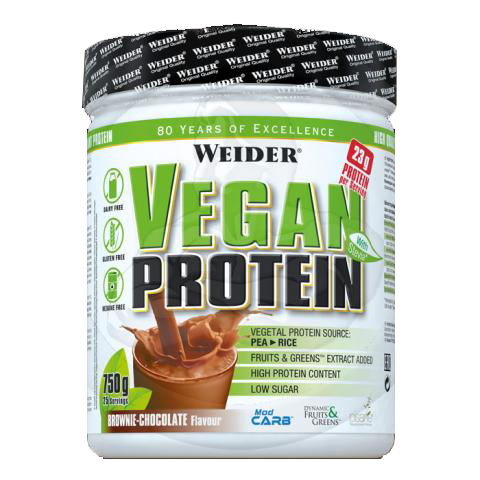
Joe Weider
Joe Weider is the epitome in the world sports nutrition. The man Joe Weider, who stands behind the brand, has already trained and supplied bodybuilders such as the legendary 7-time Mister Universe Arnold Schwarzenegger with food at times when the whole bodybuilding scene was still completely unknown and in its infancy, yes, was even scorned and frowned upon. Today, Joe Weider is a leading brand that stands for the highest quality in terms of nutritional supplements and is exported from Germany to 120 countries. Joe Weider is sports nutrition history!
Joe Weider is made for athletes and bodybuilders and therefore has a clearly sporty approach. His range regarding vegan protein is still small with just one product, but very high quality and high protein content (76/81%). The goal is also called here: Muscle building. The taste is pretty good. One has made an effort at Weider to give customers something that they can take without any problems. The vanilla flavor comes close to the vanilla taste, but vegan also means vegetable and the protein powder mixed with water is thick and fibrous depending on the water content - has after all plant fibers in it - and therefore always has a little bit of a vegetable taste. If you are looking for a vegan protein that is absolutely acceptable in terms of taste, you will hit the bull's eye with Joe Weider. Athletes and bodybuilders who need a high-quality protein for their muscle building, which is top in terms of protein content and price and pleasant in terms of taste, choose Joe Weiders vegan protein!
Winforce
Winforce is the youngest and most modern Swiss supplier of sports nutrition that I know. The label, which was founded by a wrestler, always stands out with very special products that look unique. When it comes to taste, however, the guys from central Switzerland sometimes take a lot out of their customers, I'm thinking of the "Booster". They maintain a very modern marketing and involve very many athletes in their marketing work. The design they choose is also modern. Winforce has a single vegan protein in their line, a powder made from lippune seeds and sunflower with a protein content of 66%. Taste-wise it's okay, it tastes vegetable or slightly bitter mocha-like, but a treat is something else. Price-wise it is set rather high in international comparison, - that's just the cross with Switzerland - the use is aimed at athletes and athletes who want to cover their protein needs with vegan protein. The goal is primarily muscle maintenance.
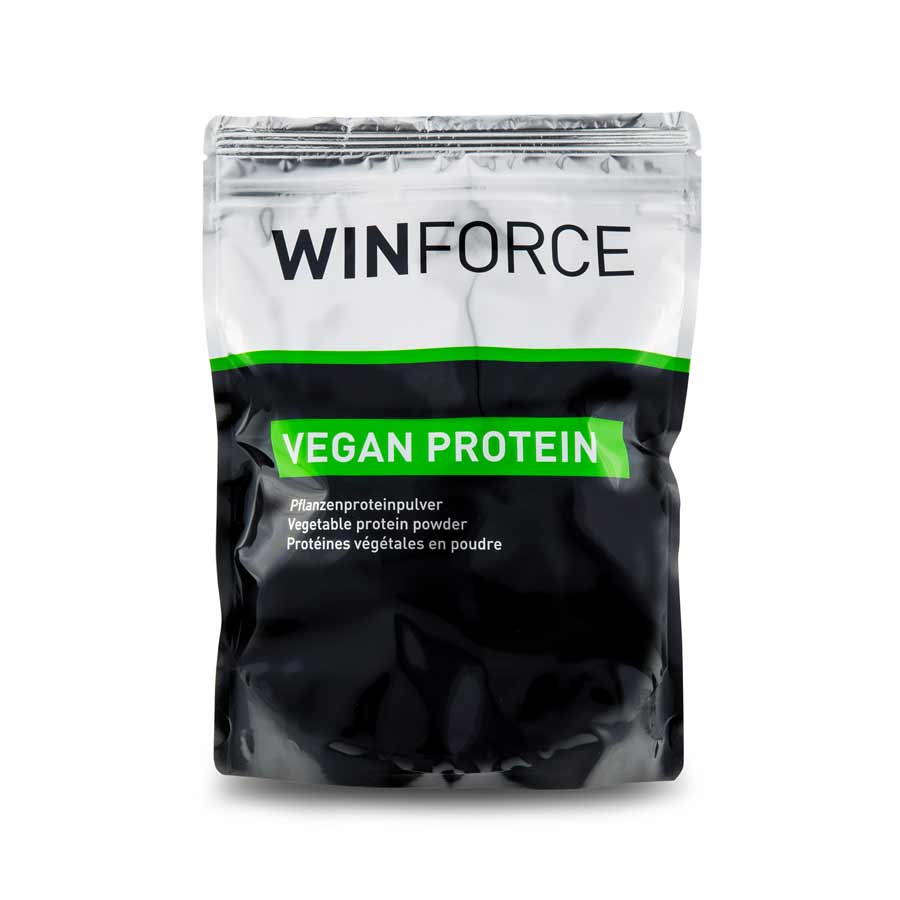
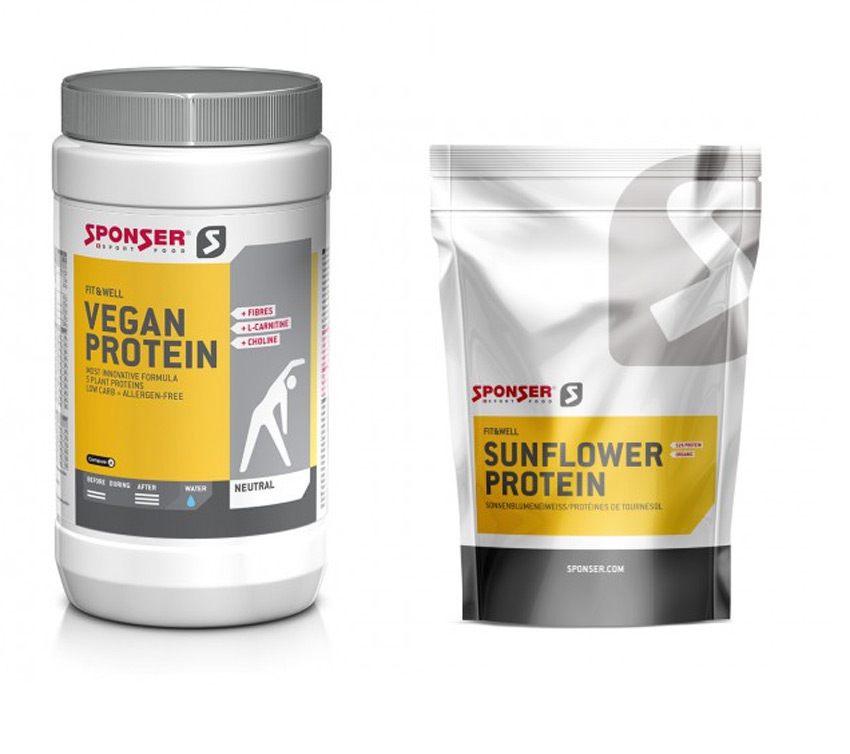
Sponser
Sponser is a well-established Swiss sports nutrition brand that has been successfully producing nutritional supplements for athletes for decades and is now present in about 30 countries. It emphasizes its correctness in ingredient claims (it does not use tolerance in claims) and it is FSC 22000 certified in food safety. Despite recent revisions, the design of the packaging looks rather dull and sterile by international standards. Vegan is a marginal product for Sponser, which is in vogue. It is therefore not surprising that Sponser only offers two products in the "vegan protein" range, on the one hand the "Vegan Protein", whose protein is obtained from sunflowers, pumpkin, carob seeds, peas and rice, and on the other hand the "Sunflower Protein", whose protein is obtained exclusively from sunflowers and comes from organic farming. When dissolved in water, the Vegan Protein tastes reminiscent of wood and plants. At this point, we must especially praise the fact that the manufacturers of Vegan Protein have succeeded in producing a very fine powder that does not feel so fibrous or musty, but very light and fine. Compliments on that! The taste of the Sunflower Protein is relatively neutral with a slightly floral note with a very slightly bitter finish, the consistency is clearly more floury, as if you were to dissolve a flowery flour in water. This already wants to be used more as an additive in muesli, yogurt or soups. With a protein content of 56% or 52%, the proteins are in the middle class. It is probably intended as a vegan option for muscle maintenance. Price-wise you have the same problem as Winforce, you are simply much more expensive as a Swiss product. It is questionable how seriously and committed Sponser actually wants to run the vegan offer. For existing fans and customers of Sponser, the products are an interesting protein alternative.
Purya
Healthy food from Hamburg, that is Purya. All products from the house of Purya are 100% organic! The colorful design looks appealing and speaks for vitality and a modern orientation, no laboratory frass! In view of the rich palette, it already shows that Purya can do a lot with the term "vegan" in contrast to classic sports nutrition manufacturers and customers can find a large selection of high-quality vegan products here. In terms of taste, we received samples of protein shakes with protein content around 35%-50%, which contained a correspondingly large amount of carbohydrates and sugar. Therefore, even the opened package of vanilla-strawberry exuded a seductive aroma of stimulating, fruity sweetness as if something was just caramelized. The powder could not completely dissolve in the water to a homogeneous mass. Red (probably the strawberries?), white and black granules floated in the brown-colored water and rose to the surface or settled to the bottom. When rinsed out, a fine fruit/food sand remained, composed of different colored fine grains. Taste-wise, it was very pleasant; a very slightly sweet fruit flavor unfolded in the mouth. With the water you felt the bland, with (vegetable) milk (for purebred vegans) it would certainly be a taste sensation, if not top cuisine, but certainly 4 out of 5 points. The question is of course how the high-percentage protein drinks taste or those without sugar, I still have a sample bag, I will also test. Of the protein drinks, the "Raw" has hardly any sugar and the least of all. The powder dry smells like clay, dissolved in water the smell reminds of yeast and in the mouth it has the taste similar to a cream of asparagus soup with a little sand, again the powder does not dissolve completely in water, although much better than the strawberry vanilla shake. In terms of consistency, the powder is either completely dissolved or still very slightly sandy, but hardly fibrous or a mush. Again, best used as an additive to existing flavor (milk, soup, drink, etc.).
Timo Lehnert, CEO of Purya, writes to me about my review: "What bothers me is that you judge the taste by mixing water. We have designed the drinks to be stirred with plant drinks and that is how they are consumed by our consumers. The fact that some of the drinks do not dissolve completely is mainly due to the sprouted ingredients (quinoa and flaxseed). We don't get them ground as finely. But most consumers quite like that, especially since many take these drinks as meal replacements."
There is a lot to be said for Purya, not only is the manufacturer listed on the important "Cologne List" in Germany and is thus used and recommended by sports professionals, no also the variety of shakes that are available for different purposes (muscle building, figure maintenance, etc.), the variety of protein sources, which to all that come from organic farming, clearly speak for Purya. Also the taste is sometimes almost bomb. Here you can see that the makers have really put a lot of effort into giving the customer a taste experience as well and not just healthy food, because that is exactly what carnivores like to say about vegetarians and vegans, namely that the food may be healthy, but often inedible. Purya proves otherwise. Vegans and customers looking for vegan supplements are in the right place at Purya! Period!
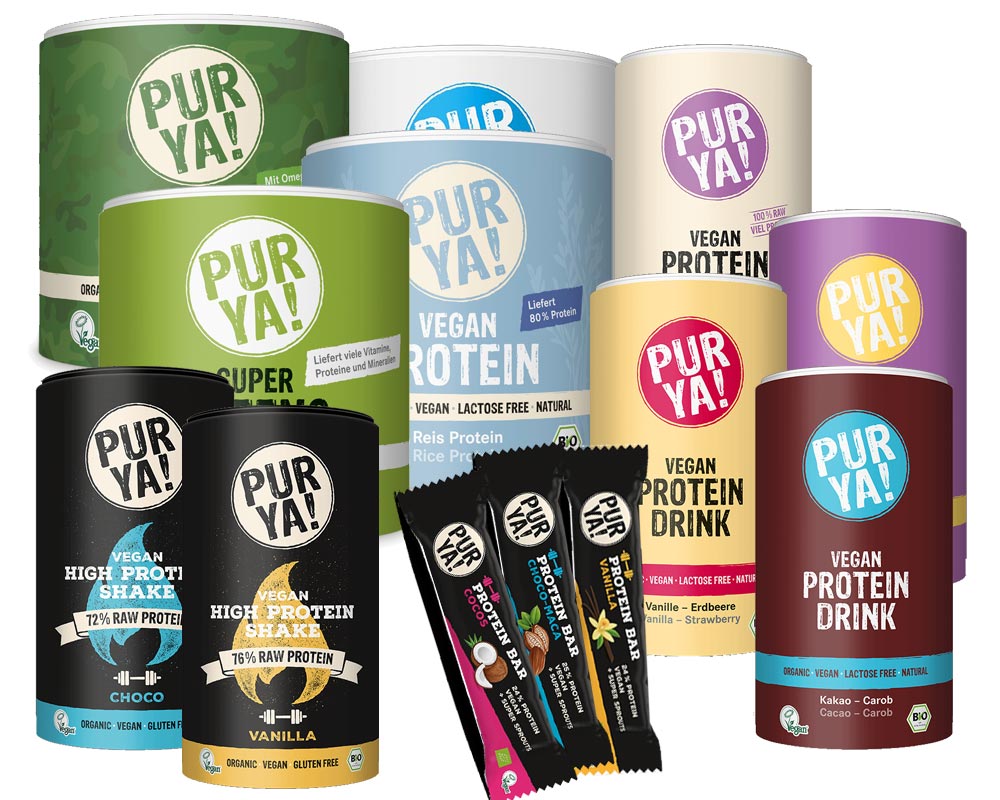
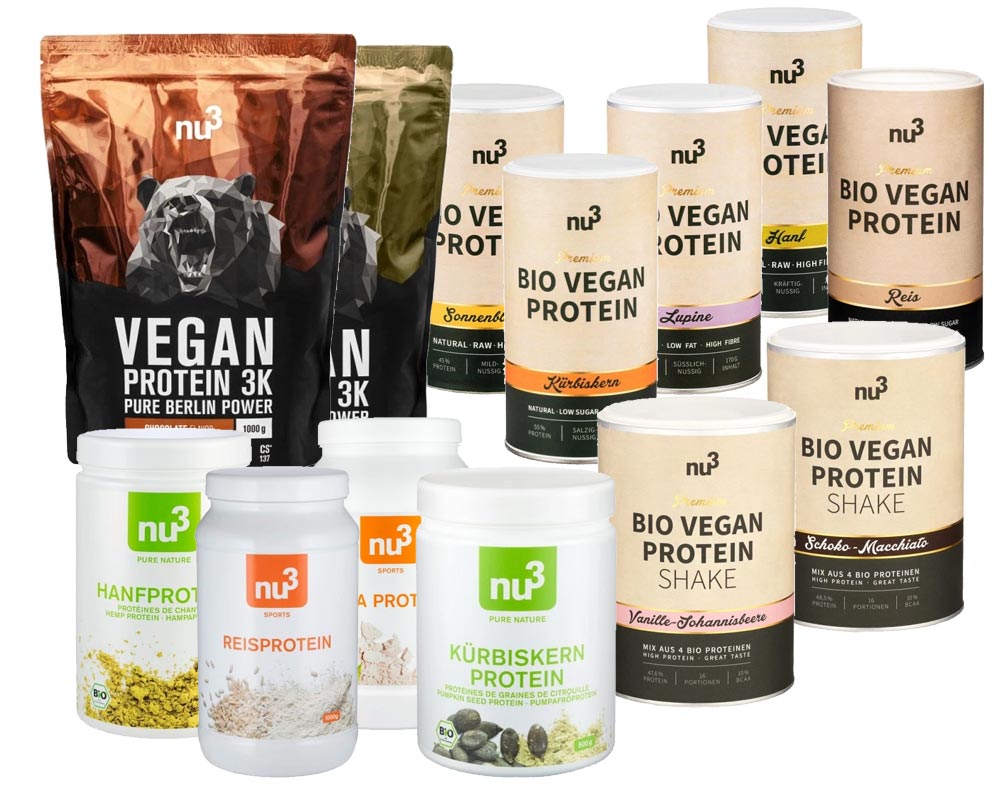
Nu3
Nu3 is a modern food label from Berlin. Nu3 is all about conjuring up modern, trendy lifestyle cuisine on the table and inspiring and tempting the households of this world with unique creations to enjoy. Founded in 2011 by three friends, the company now stocks 6000 items and appeals to the entire population, which is why you can also find nu3 in branches of major retailers. At nu3, it's not about sports, but about lifestyle and enjoyable cuisine, and the three guys and their employees do a masterful job of conjuring that up. We were all the more excited about the vegan protein from nu3. The design of the packaging of the "Vegan Protein 3K" that we received - the protein is available in 1 kilo bags - is modern and stylish. However, after tearing open the chocolate bag, it was not possible for me to close the bag. Probably should transfer the bags into cans and storage containers. Taste-wise, the smell from the bag was too industrial, in the stirring cup the vanilla smelled slightly vanilla, probably the best scent so far. Stirred with water, the protein powder dissolved completely and also showed up in the mouth not fibrous, but mainly liquid with a minimal powdery residue. Taste-wise, the vegan protein from nu3 was the best so far, as it was slightly sweet, very pleasant and also had a slight vanilla flavor. A very pleasant taste experience that makes you want to take it again. The "Chocolate" flavor also tastes chocolaty and is creamy with a slight powdery component to the consistency. In terms of taste, the nu3 is so far the clear frontrunner among the tested vegan protein powder.
Overall, nu3 has a respectable range of vegan protein, which is offered at different price categories and in different quality categories. There is actually something here for everyone who wants to stock up on vegan protein. It is not the sporty approach that nu3 lives, but the enjoyment factor and lifestyle, accordingly the design of the packaging often shows lifestylish and high-quality. Not only the variety speaks for nu3, but also the taste, although it should be added that I could only try the one high-percentage "Vegan Protein 3K". Nu3 will clearly score in the field of "vegan protein" for these reasons.
Hammer Nutrition
Hammer Nutrition was brought to our attention by the Swiss representative, Sportbenzin.ch. Hammer Nutrition is an American sports nutrition company for endurance sports with headquarters in Whitefish, Montana/USA, founded in 1987 by Brian Frank. All Hammer products meet Level 3 certification under SQF 2000 (Safety Quality Food Code 2000) worldwide. Geared towards endurance sports such as triathlon. Cycling, etc., Hammer Nutrition offers products that address the needs of such athletes such as providing optimal hydration, optimizing caloric intake, mineral supplementation, etc. Hammer Nutrition is therefore not as strong on muscle building as, for example, a Joe Weider, who is strongly at home in bodybuilding, but rather on muscle maintenance and protein coverage. According to Remo Thömy of Sportbenzin, Hammer Nutriton forms a high-quality alternative among vegan proteins due to its exciting mix of protein sources. The scent from the opened is indefinably industrial, in the cup it smells herbal and slightly acidic, but not vanilla. Dissolved in water it smells herbal sweet, not vanilla, and in the mouth it tastes herbal sweet with a very slight powdery sandy part on the tongue, it dissolves pretty well in water. Even if the taste is not really well definable, the shake is quite pleasant. If you then pay attention to the medium-high protein content of the protein drink, then this actually appeals more to endurance athletes who have a rather low body weight and primarily want to cover their protein needs with it, without targeting an extreme muscle building with it, because that would ultimately mean more body weight again. Hammer Nutrition therefore seems to be the right choice for the endurance athlete who is looking for a vegan alternative to cover his protein needs.
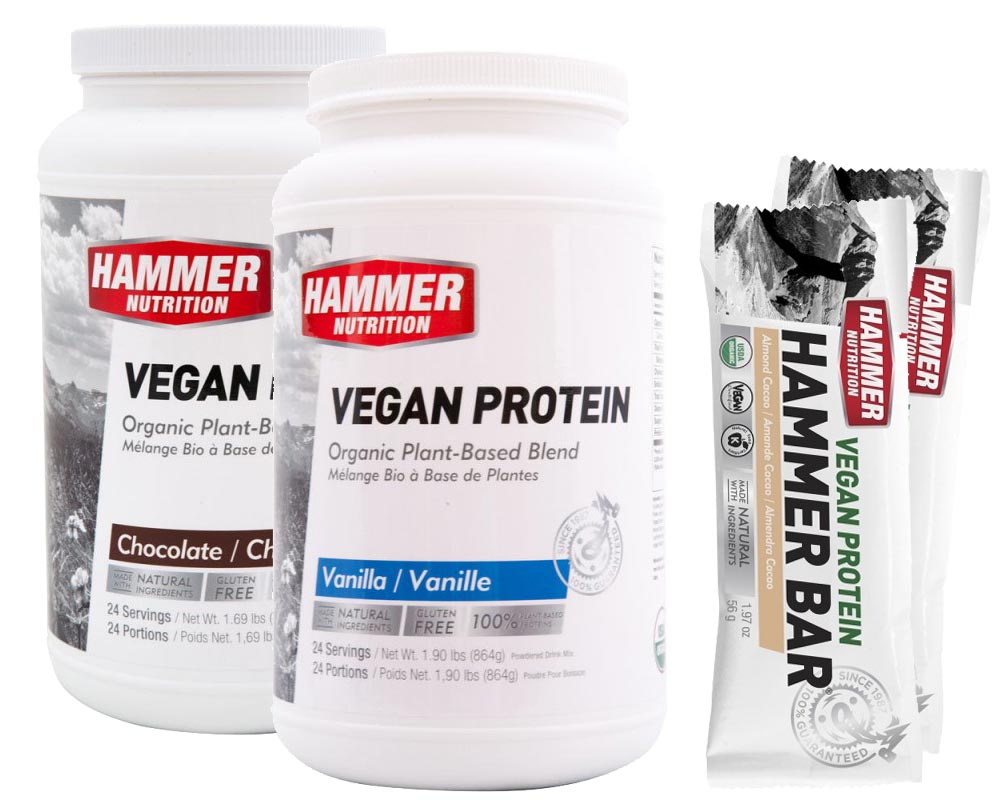
Provider comparison
Based on the analysis made, it quickly becomes clear that suppliers who want to address all consumers with a broad range of products, such as nu3, or even specifically health-conscious and vegan customers, such as Purya, also have a significantly wider range of products as suppliers than suppliers from the classic sports nutrition sector. The sports nutrition manufacturers have indeed taken up the topic, since vegan is obviously a trend that has also reached them, but when looking at the range, vegan protein still shows itself as a clear marginal product, which is why suppliers who do not come from the sports corner clearly score here. According to the respective target group of the brand, the product always appeals to a slightly different target group, also due to its orientation. It will be exciting to see how the market develops in this area.

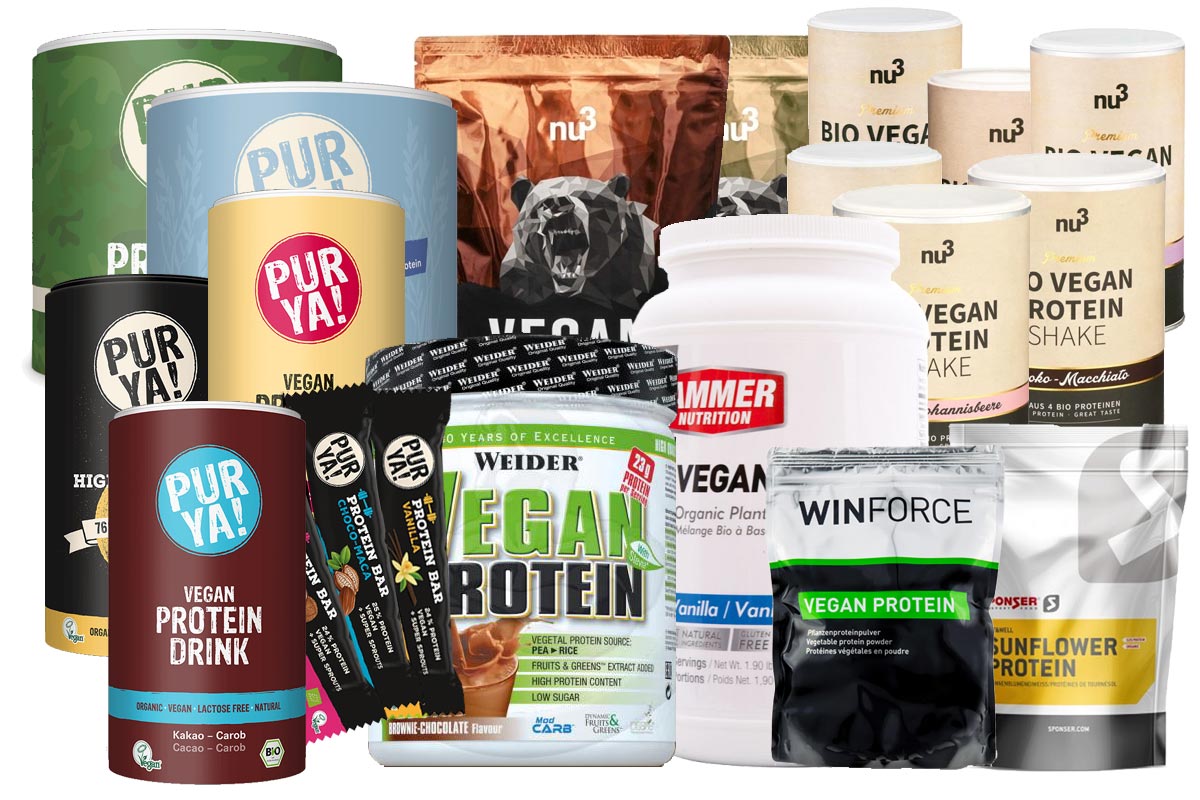




2 thoughts on “Veganes Protein: Der grosse Marktvergleich”
Hello
I only came across this article now, as I am currently interested in vegan protein powders. Anyway, thank you for the extremely helpful research, so it was much easier to decide me for a product (or 2). Additional challenge is then still the research about addition of sugar or sweeteners ...
Thank you and greetings Sabine
Hello Sabine
Thank you very much for your positive comment. I am extremely pleased that I could help you with this comprehensive article and that my article was successful. If you have any suggestions for further articles, just send us an email to [email protected]